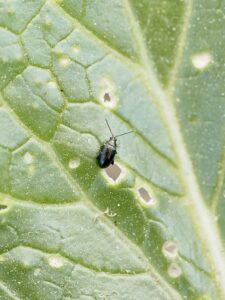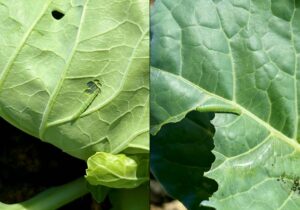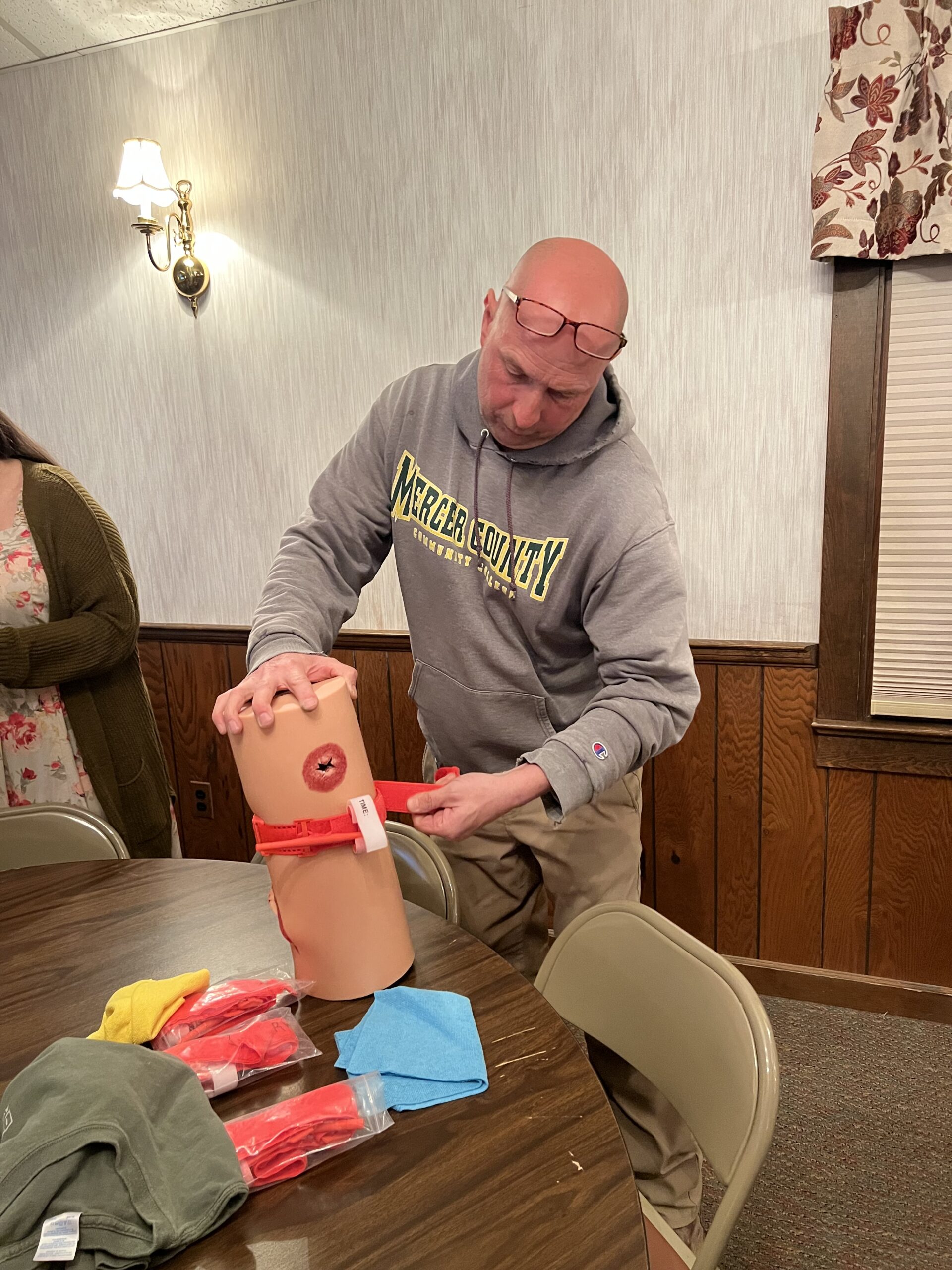Sweet Corn
We’ve put out corn earworm pheromone traps throughout the state. While silking corn is the main target of CEW activity, we set the traps early to detect overwintering moths, which have become more common with warmer winters. As a reminder, we’re no longer using blacklight traps as of this year, and we’ll be reporting pheromone trap counts in the Plant Pest Advisory as the season progresses.
Cole Crops

Flea beetle surrounded by feeding damage. Picture by Maria Cramer.
Flea beetle are active in various cole crops. This year, they have been especially prevalent in Napa cabbage and bok choy. Young plants are especially vulnerable to attack from flea beetles. The treatment threshold for flea beetles in heading cole crops is 50% infestation.

Left: Diamondback moth caterpillar, showing characteristic tapering at each end. Right: Imported cabbageworm caterpillar showing characteristic fuzziness. Pictures by Maria Cramer.
We’re seeing caterpillar activity (imported cabbageworm and diamondback moth) in cabbage and other cole crops. Treatment thresholds vary between crops and growth stage, but for heading cole crops between early vegetative and cupping, the treatment threshold is 30%. At this stage, sprayable Bt products (IRAC 11A) such as Dipel, Xentari, or Javelin can be effective on young caterpillars. Other materials approved for caterpillar control include Entrust/Radiant (IRAC 5), Proclaim (IRAC 6), Torac (IRAC 21A), and Exirel (IRAC 28). For Bt products and contact insecticides, coverage on the undersides the leaves is essential.
Tomatoes
In high tunnel tomatoes, we’re seeing limited aphid, thrips, and spider mite activity. If dealing with primarily aphids, products such as Beleaf (IRAC 29) are recommended, especially if plants have reached the flowering stage. For thrips, Entrust, Radiant (IRAC 5) and Torac (IRAC 21A) can be used. For spider mites, Nealta (IRAC 25) is an effective material that is more friendly to beneficial insects, but Portal (IRAC 21A) and other materials can be used to manage populations.
Please consult the Mid-Atlantic Commercial Vegetable Production Guide for a more comprehensive list of materials that are labeled for specific crops and pests. As always, be sure to follow label rates and application instructions.
Authors: Amanda Quadrel (Northern NJ Veg IPM coordinator) and Maria Cramer (Southern NJ Veg IPM coordinator)

 All New Jersey farmers are invited to attend this Farmer Resource Fair which will feature an array of agricultural service providers. In-between a light breakfast and a hearty lunch, there will be engaging presentations and opportunities to visit with service providers at their table displays. The program schedule, as well as a preliminary list of service providers who’ve confirmed their attendance, is included below.
All New Jersey farmers are invited to attend this Farmer Resource Fair which will feature an array of agricultural service providers. In-between a light breakfast and a hearty lunch, there will be engaging presentations and opportunities to visit with service providers at their table displays. The program schedule, as well as a preliminary list of service providers who’ve confirmed their attendance, is included below. Rutgers Cooperative Extension, in partnership with the Vegetable Growers Association of NJ and the Rutgers NJ Medical School, will host a Stop the Bleed training on Tuesday, April 8, 2025 from 10:00 am to 12:00 pm at the Rutgers EcoComplex located at 1200 Florence Columbus Rd, Fieldsboro, NJ 08505.
Rutgers Cooperative Extension, in partnership with the Vegetable Growers Association of NJ and the Rutgers NJ Medical School, will host a Stop the Bleed training on Tuesday, April 8, 2025 from 10:00 am to 12:00 pm at the Rutgers EcoComplex located at 1200 Florence Columbus Rd, Fieldsboro, NJ 08505.
